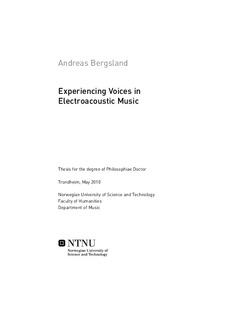| dc.contributor.author | Bergsland, Andreas | nb_NO |
| dc.date.accessioned | 2014-12-19T13:07:11Z | |
| dc.date.available | 2014-12-19T13:07:11Z | |
| dc.date.created | 2011-03-01 | nb_NO |
| dc.date.issued | 2010 | nb_NO |
| dc.identifier | 401162 | nb_NO |
| dc.identifier.isbn | 978-82-471-2130-6 (printed ver.) | nb_NO |
| dc.identifier.isbn | 978-82-471-2132-0 (electronic ver.) | nb_NO |
| dc.identifier.uri | http://hdl.handle.net/11250/243587 | |
| dc.description.abstract | This dissertation presents a framework for describing and understanding the experience of voices in acousmatic electroacoustic music and related genres. The framework is developed with a phenomenological basis, where the author’s own listening experience has been the main object of study. One component of the framework has been to group aspects that potentially can be attended to into experiential domains based on some common feature, relationship or function. Four vocal experiential domains related to the voice are presented along with three domains not directly related to the voice. For each of these domains, a set of concepts are introduced allowing for qualification and description of features of the experience. The second component of the framework, the maximal-minimal model, is partly described through these domains. This model presents maximal and minimal voice as loosely defined poles constituting end points on a continuum on which experienced voices can be localized. Here, maximal voice, which parallels the informative and clearly articulated speaking voice dominant in the radio medium, is described as the converging fulfillment of seven premises. These premises are seen as partly interconnected conditions related to particular aspects or features of the experience of voice. At the other end of the continuum, minimal voice is defined as a boundary zone between voice and non-voice, a zone which is related to the negative fulfilment of the seven premises. A number of factors are presented that potentially can affect an evaluation of experiences according to the premises, along with musical excerpts that exemplifies different evaluation categories along the continuum. Finally, the two frameworks are applied in an evaluation and description of the author’s experience of Paul Lansky’s Six Fantasies on a Poem by Thomas Campion
. | nb_NO |
| dc.language | eng | nb_NO |
| dc.publisher | Norges teknisk-naturvitenskapelige universitet | nb_NO |
| dc.relation.ispartofseries | Doktoravhandlinger ved NTNU, 1503-8181; 2010:84 | nb_NO |
| dc.title | Experiencing Voices in Electroacoustic Music | nb_NO |
| dc.type | Doctoral thesis | nb_NO |
| dc.contributor.department | Norges teknisk-naturvitenskapelige universitet, Det humanistiske fakultet, Institutt for musikk | nb_NO |
